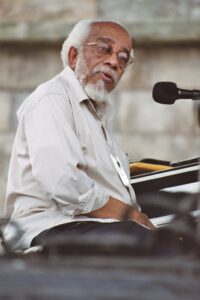
Display caption
Image: Barry Harris. Credit:
Pianist Barry Harris was the 1996 recipient of the Living Legacy Jazz Award.
Since 1960, Mr. Harris has been a resident of the mid-Atlantic region (originally from New York and currently Weehawken, NJ). As a recording artist, he can be heard on CD’s both as a leader and sideman. His innovative and fluid performance style has inspired critics to call him the “Keeper of the BeBop Flame.”
Over the years, Harris has played with many of the greats such as Charlie Parker, Miles Davis, Dexter Gordon, Sonny Stitt, Max Roach, and been particularly influenced by pianists Bud Powell and Thelonious Monk. He has been a frequent winner in the DownBeat Annual Critics and Readers Polls, and in 1989, was awarded the Jazz Masters Award from the National Endowment for the Arts.
But it has been his stature among his fellow musicians that is the most impressive statistic of all. When speaking of Harris, musicians young and old describe a simple man with an abundance of talent, patience and goodwill – whose lifetime has been committed to continuing the legacy of jazz through his personal, one-on-one contribution of time, resources and talent.
Barry Harris was born in Detroit during what are called the “golden years of jazz” and began playing the piano at age four. He led his own combos in high school and was soon sought after as an accompanist by jazz stars who came to town without a band. He developed his own theory of jazz instruction, and by the age of twenty had several students, among them Yusef Lateef and Joe Henderson. In 1960, he joined Cannonball Adderly’s band and moved from his Detroit home to New York City.
In 1982, Harris founded the Jazz Cultural Workshop in New York City, a venue where jazz musicians could go and study in the tradition. With a true commitment to the music, Harris created a spot that did not serve alcohol so that young people could attend as well. Despite ongoing financial challenges, the Jazz Cultural Workshop is still going strong with classes on Monday and Tuesday nights. The cover charge is only $7 and the program lends assistance to anyone that walks through its doors. Harris continues to personally work with each artist – building an appreciation in the music for beginners, developing phrasing skills for singers, working on accompaniment for pianists, and honing improvisation techniques for horns.
On the subject of teaching jazz, Barry Harris is eloquent, “Teachers should teach where they came from, not where they are. They tell you that life is complex and you have to suffer to give of yourself, and that’s not true. Life is very simple, and if you simply live and simply learn to play, you’ll really give.” The New York Times identifies Harris as one of the living masters of jazz piano and a one man jazz academy.
Barry Harris (1929-2021)
*Bio from Award presentation.